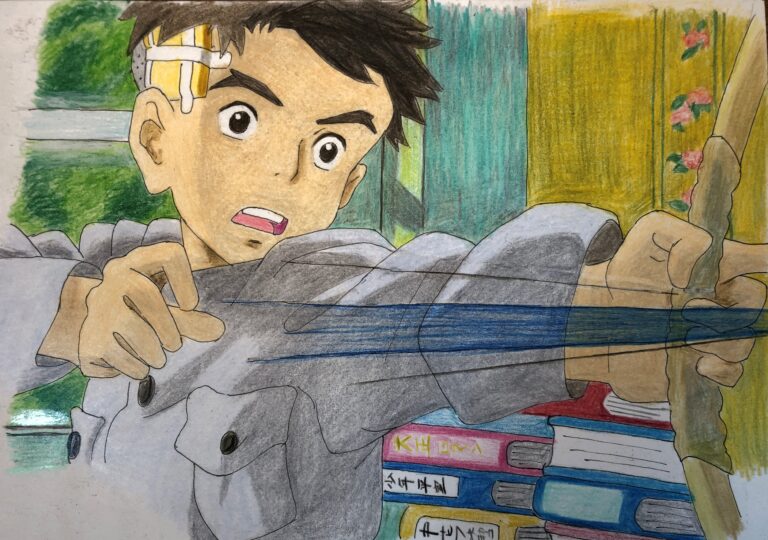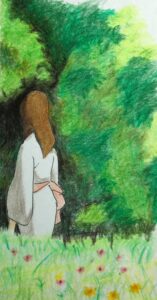
Mahito wonders if that’s Aunt Natsuko over there, but he continues making the arrow.
The feathers used are from a grey heron.
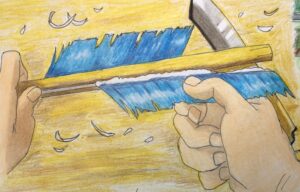
Once the arrow was complete, He pulled the bow to test it out.
The feathers began to move, as if they were dying to fly.
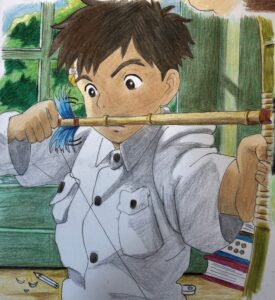
And the arrow will fly off on its own.
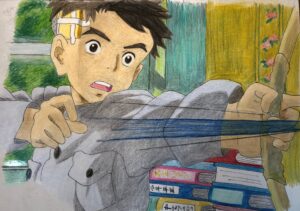
The arrow flies as if on wings and pierces the wall with force.
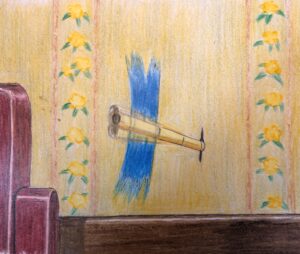 I added to the picture the way the arrow vibrates as it is stuck in the wall.
I added to the picture the way the arrow vibrates as it is stuck in the wall.
Mahito is stunned.
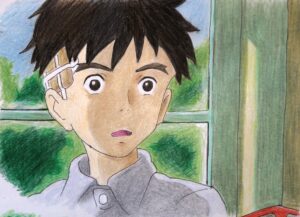
He pulls out the arrow that is stuck deep inside and adjusts it. As he does so, his hand hits a book on the desk and it falls to the floor.
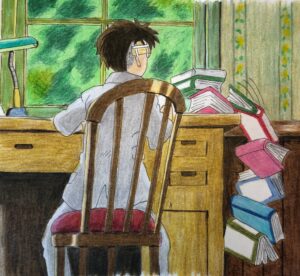
He was cleaning up the books on the floor. One book
It was written in his mother’s handwriting:
To Mahito when he grows up.
The year was 1937 (Showa 12).
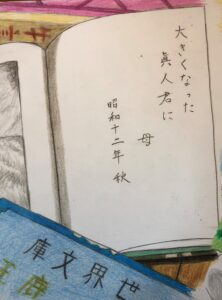
It was written by his mother, Hisako, in 1937.
The Pacific War began in 1941. Hisako died in the third year of the war, in 1943. Why did she write it six years before she died? When Mahito was old enough to read this book, Hisako should have told him to read it herself. But Hisako knew that this was not possible. She knew approximately when she would die. How she knew will become clear later.
This is the book my mother left for me.
The title of the book translates to “How Do You Live?”
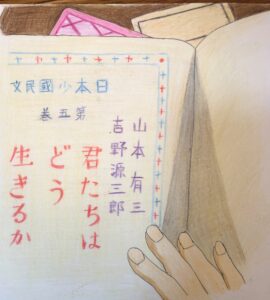
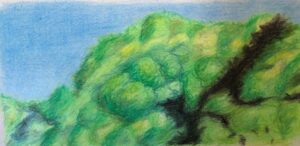
There’s some really great music playing in this scene.
Memories of his mother bring tears to his eyes and soak the book.
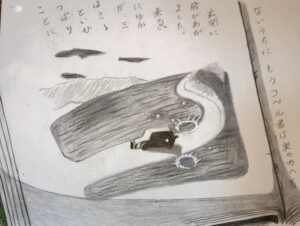
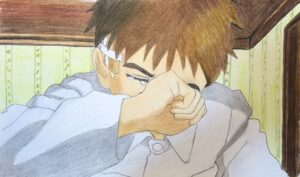
“Ma’am~” “Ma’am~”
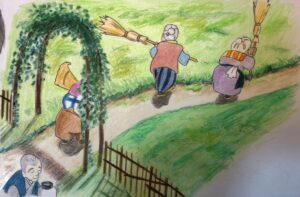
“What’s wrong?” “Miss Natsuko isn’t here in her room.”
“I’ll come too.”
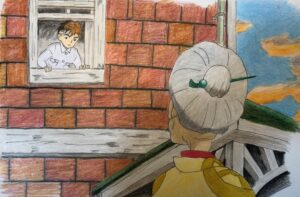
mahito: “I saw her heading towards the forest earlier.”
“The young lady?”
“It was a long time ago. It was still light out. She must have gone into the forest.” “There are no herons here today. That’s strange. Let’s go.” “Huh?”
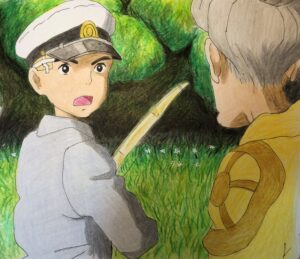
“Let’s go back now. The young lady wouldn’t come to a place like this.” “I don’t think she came because she wanted to.”
In other words, he is saying that it is not Natsuko’s will, but that she is being manipulated to take advantage of her weak heart and bring Mahito to her.
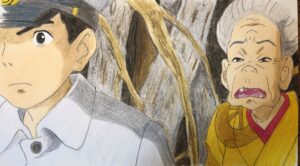
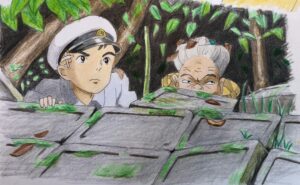
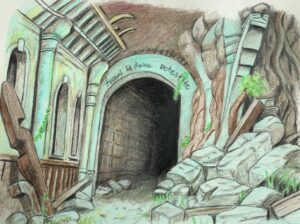
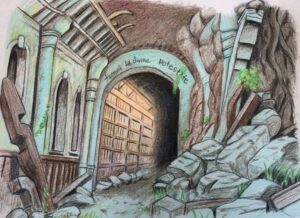
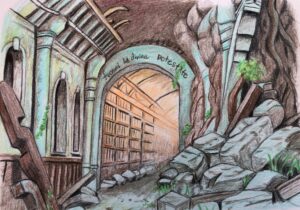
I drew all the lights on to depict the moment the lights come on, and then I turned them off.
The gate is inscribed with “Fecemi la divina potestate.” I wondered if it had any meaning, so I looked it up and found out that it is a quote from the Inferno of the Divine Comedy by Italian poet Dante, written in the early 4th century.
It seems to be interpreted as divine power, unparalleled wisdom. From that, we know that this gate is the gate to hell. A passage from Inferno says, “He who passes through these gates must abandon all hope.” Which hell is Dante referring to?
My interpretation is that the only destination beyond the pursuit of pleasure, greed, and sloth (the development of civilization) is hell. I thought it was referring to the current situation. Maybe not…
This goes beyond Ghibli. There are many tricks that most viewers will not notice.
“It is a trap. A trap”
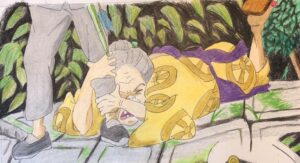
“Heron Man. I’m here. Free Natsuko.”
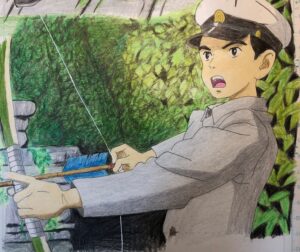
We’ve been waiting for you. Come on in.”

You go back. I’m going.”
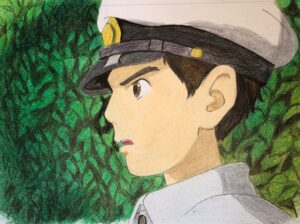
Don’t go! We cannot hear the voice of the lord of the house. Only those who have the blood of the house can hear him.
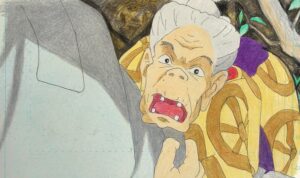
Then I’ll have to go. I have to get Aunt Natsuko back.”
「No, you can’t! You think you are better off without Miss Natsuko, don’t you?Still, it’s weird that you’d go.」「He says my mother is alive. It’s a lie, of course.But I have to be sure it’s not true.」
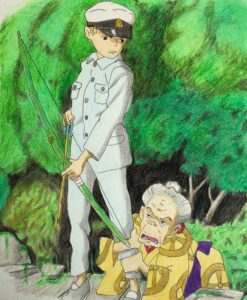
Does Mahito wish Natsuko would go away? There is no indication in the work that Mahito dislikes Natsuko. Natsuko’s depression is related to Mahito’s injury. She probably feels responsible for that, and more importantly, she is his mother’s sister. I don’t think she would dislike her. I think so. Chirico seems to think she hates her.
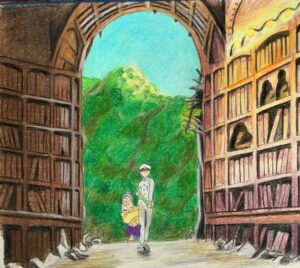
I was never very good at drawing mountains or trees. This is the first time I think I was able to draw them a little better. Every scene is difficult and every scene is a new challenge. When I paint Ghibli’s works, I naturally become able to paint any kind of picture. This picture is a picture in which I gave about 90% of my ability. It seems that the upper limit will continue to rise.
“ rattle”“ rattle”・・・・・The gates are closing.
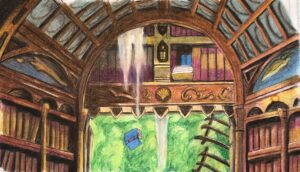
A large number of books are stored on the entrance wall. There is dust falling from the top, which must be represented. The shadows and the luster of the light are drawn in great detail, an elaborate detail that has never been seen in Ghibli before. You can see that the images are made with a lot of care and attention.
Thump!! The gates are closing.and・・・・・
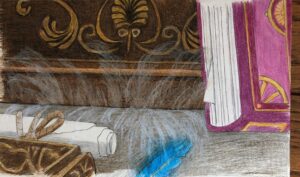
The stone sculptures start to move…
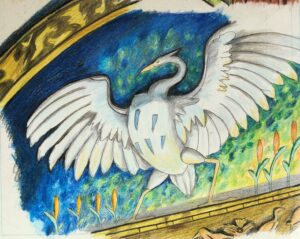
Heron sculpture swells
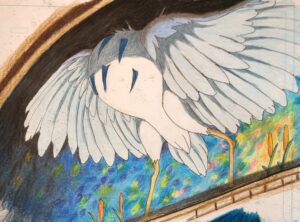
Flutter Flutter
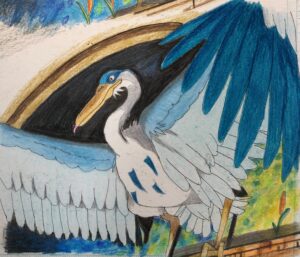
End of vol. 3 Continued in vol. 4
I would like to express my sincere gratitude to Director Miyazaki and the Ghibli staff for leaving us with such a wonderful work.
